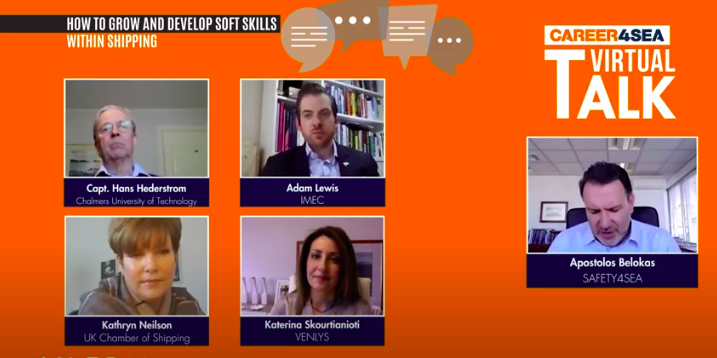Soft skills development is probably the most powerful tool in terms of retention of seafarers in the shipping industry which needs to be more flexible if it wishes to adapt in the post-COVID-19 working environment, experts agreed at a recent CAREER4SEA Talk.
Soft skills development is probably the most powerful tool in terms of retention of seafarers…But I suspect if we went down to the root cause why people leave companies it’s how they’re treated on board, it’s how they’re treated by the companies and it’s how they feel as an individual, so if we were to develop this I could almost guarantee without seeing the data that this would be the most powerful tool that companies have in their back pocket for retention,
…noted Adam Lewis, Head of Training & Operations, IMEC.
[smlsubform prepend=”GET THE SAFETY4SEA IN YOUR INBOX!” showname=false emailtxt=”” emailholder=”Enter your email address” showsubmit=true submittxt=”Submit” jsthanks=false thankyou=”Thank you for subscribing to our mailing list”]
What used to be considered as the “future of work” has already arrived, with the COVID-19 accelerating automation expected to displace 85 million jobs by 2025, recent data by the World Economic Forum revealed. As the workforce is automating faster than expected, the most competitive organizations will be those that choose to reskill and upskill current employees, a WEF report said.
But why is soft skills development important amid this landscape? Either for a seafarer or not, soft skills development is vital all the way through our life because without soft skills we can’t sell ourselves to future employers; we can’t communicate properly, said Kathryn Neilson, Director, Merchant Navy Training Board, UK Chamber of Shipping.
And you might be the brightest person on the earth with the most incredible qualifications but if you don’t have the communication skills to sell that talent then you know we’re wasting our time,
…she explained.
What are the key drivers and barriers for soft skills development in shipping?
With respect to the retention of seafarers, every shipping company should have a specific competency framework and promotion criteria developed for their specific needs, in order to inspire prospect students, stressed Capt. Hans Hederstrom, Professor of the Practice, Dept. of Mechanics and Maritime Sciences, Chalmers University of Technology, on his part. For example, visualizing the path from cadet to captain and chief engineer could facilitate recruitment of new students and retention of existing officers and engineers.
In addition, if the shipping industry wishes to identify skills gaps and help the seafarers develop them, the game-changer will be the cooperation of authorities with the shipping companies, as it will help the latter identify what it is that they want from their seafarers, Mrs. Neilson added.
Big data will be another way to drive forward, according to Mr. Lewis:
I think as an industry, if we want to grow, if we want to go into this sort of higher level, I think there might be a possibility here to use a lot more collaboration between different companies rather than isolation and perhaps use big data to try and actually look at exactly what’s happening onboard and how we develop strategies going forward,
…he said.
Even though there has been currently observed a growth in terms of identification of soft skills in the industry, at least the majority of shipping companies have no systematic tracking of the strong link between day-to-day work performance and training effectiveness, according to data by Katerina Skourtanioti, Managing Director of Maritime Specialization Services provider VENLYS.
We need a fast-growing mindset in the shipping industry; we need research proper mapping of safety culture of the company. Actually, we have done this with many companies and the findings are indeed fascinating as they’re all about non-technical skills,
…she informed.
What is the way forward?
Recruiting and training is a major point of focus with respect to soft skills, according to Mr. Lewis.
I think there is a lot to do still there’s a lot to improve on things like HR skills management, skills onboard, but we also have to recognize that it is a very unique situation onboard and we have training people to be sort of dynamic much more than they have to be in their shore side well,
…he said.
By developing a new technology in the training sphere we are definitely going to improve competency levels and success rates for cadets when they’re doing their training without a shadow of a doubt it’s been very successful so far,
…noted Mrs. Neilson.
The maritime industry is investing in someone from an early age which is a huge risk, but we can solve this problem by just being open to second or third careers in the industry, added Mr. Lewis, “rather than just thinking all the time that we need to recruit 18-year-olds and train them up in house”.
We need to go away from the control and compliance culture and look at how procedures are written. Many procedures are written to cover the backs of shore site managers and that must go away,
…adds Capt. Hans Hederstrom, adding that the key driver here is we must select the right leaders and train them properly.
I truly believe that either we change, especially when it comes to human factor, or we stay behind,
…said Mrs. Skourtanioti.




































































